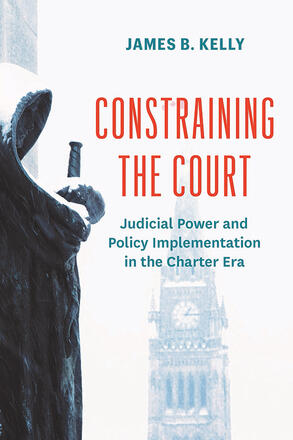
Constraining the Court
Judicial Power and Policy Implementation in the Charter Era
Categories: Political Science, Public & Social Policy, Law & Legal Studies, Law & Society
Series: Law and Society
Publisher: UBC Press Show Edition Details
Paperback : 9780774870481, 448 pages, December 2024
Ebook (PDF) : 9780774870498, 448 pages, May 2024
Ebook (EPUB) : 9780774870504, 448 pages, May 2024
- Short alternative textual descriptions.
- Single logical reading order.
- Index provides links to item references.
- Next heading / previous heading, next chapter / previous chapter navigation is enabled.
- Use of high contrast between text and background color.
- Contains a table of contents that provides direct access to all chapters of the text via links.
- Full alternative textual descriptions.
- No accessibility features or content rendering options offered by the reading system, device or reading software are limited or disabled.
- Language tagging provided.
- This publication claims to meet accepted accessibility standards.
- A page list enables users to coordinate their reading with a statically paginated version.
- Use of colour is not the sole means of graphical distinction or of conveying information.
Table of contents
Introduction: Constraining the Court
1 Judicial Power and Policy Implementation in the Charter Era
2 Quebec and the Canadian Charter of Rights and Freedoms: Une province pas comme les autres
3 Minority Language Education Rights and the Charter of French Language: Plus ça change, plus c’est la même chose
4 Bridging Schools and the "Major Part Requirement": Designing and Implementing the 2010 Charter of the French Language
5 Quebec’s "Sign Law" and Freedom of Expression: Ford, Devine, and the Bourassa Government’s Response
6 Supervised Consumption Sites and the Respect for Communities Act: How the Harper Government Outflanked the McLachlin Court
7 The Opioid Crisis and Canadian Federalism: From Supervised Consumption to Overdose Prevention Sites
8 Physician-assisted Suicide to Medical Assistance in Dying: When Carter Met Federalism
Conclusion: Legislative Disagreements and Policy Implementation in the Charter Era
Appendix: Remedial Activism, 1982–2022 (Statutes, Ministerial Discretion, and Administrative Decisions)
Notes; Bibliography; Index
Description
When the Supreme Court of Canada makes a decision that invalidates a statute, it creates a constitutional moment. But does that have a direct and observable impact on public policy? Constraining the Court explores what happens when a statute involving a significant public policy issue – French language rights in Quebec, supervised consumption sites, abortion, or medical assistance in dying – is declared unconstitutional. James B. Kelly examines the conditions under which Parliament or provincial/territorial legislatures attempt to contain the policy impact of judicial invalidation and engage in non-compliance without invoking the notwithstanding clause. He considers the importance of the issue, the unpopularity of a judicial decision, the limited reach of a negative rights instrument such as the Charter, the context of federalism, and the mixture of public and private action behind any legislative response. While the Supreme Court’s importance cannot be denied, this rigorous analysis convincingly concludes that a judicial decision does not necessarily determine a policy outcome.